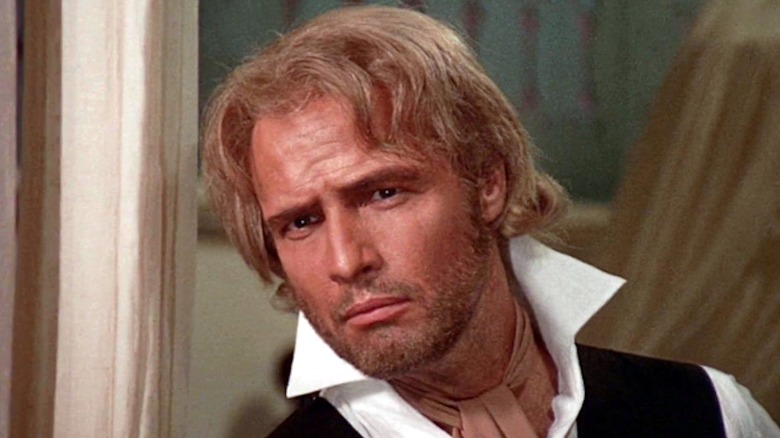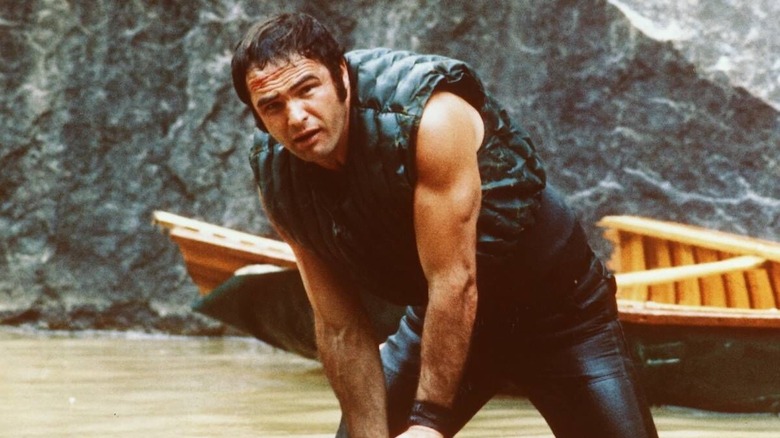Marlon Brando Rejected One Of Burt Reynolds' Best Movies For A Good Reason
There are certain classic movies that are majestic to behold, but when you consider the hardship of making the damn thing, you're kinda happy someone else went through hell and back for your entertainment. David Lean's "Lawrence of Arabia" is infamous for its rigorous shoot; the film took over a year to complete, and much of it was shot in the deserts of Morocco, Jordan, and Spain. Rewrites and Lean's painstaking attention to shot composition led to long, swelteringly hot days, and you can feel the actors laboring (very much in character). Peter O'Toole hated the desert, but the film made him a star, so his suffering proved well worth it.
William Friedkin's "Sorcerer," a very loose riff on Henri-Georges Clouzot's action-suspense classic "The Wages of Fear" (and one of Stephen King's favorite movies), finds Roy Scheider, fresh off the none-too-pleasant filming of Steven Spielberg's "Jaws," playing a condemned man on the run who undertakes the arduous task of transporting highly volatile nitroglycerin through a Central American jungle. Friedkin shot the film on location and threw every last bit of caution to the wind. Scheider said shooting "Sorcerer" made "'Jaws' look like a picnic" and feared for his life as they filmed the perilous rope bridge sequence.
And here is the obligatory mention of Francis Ford Coppola's "Apocalypse Now," the filming of which is captured in harrowing detail via Eleanor Coppola, George Hickenlooper, and Fax Behr's masterful documentary "Hearts of Darkness: A Filmmaker's Apocalypse."
Obviously, if these all-time great directors had inexplicably offered me a role in any of these hellishly brilliant movies, I would've leapt at the opportunity. But when you're a star, you can often afford to say "no," and Marlon Brando did just that when he was offered Burt Reynolds' role in one of the best films of the 1970s.
A canoe-phobic Marlon Brando turned down Deliverance
As the New Hollywood movement took hold in the late 1960s and early 1970s, you'd think that an inveterate boat-rocker like Marlon Brando would've been eager to roil the waters along with an emerging generation of directors who grew up worshipping him. Alas, aside from his stirring performance in Gillo Pontecorvo's "Burn!," the Method acting giant committed to a series of non-starters like the star-cluttered film adaptation of Terry Southern and Mason Hoffenberg's satirical novel "Candy," Hubert Cornfield's ho-hum kidnapping thriller "The Night of the Following Day," and Michael Winner's atrocious "The Nightcomers."
Given Brando's increasingly unpredictable, if not outright hostile, behavior on set, studios were not keen on directors — particularly young ones — pursuing him for risky projects. Francis Ford Coppola discovered this when he suggested (at Mario Puzo's urging) that Brando, despite his still relative youth, could play the Mafia patriarch Don Vito Corleone in his pricey adaptation of "The Godfather."
While Paramount and Coppola bickered, a young John Boorman, who'd impressed Hollywood with his neo-noir classic "Point Blank," approached Brando for the part of brash outdoorsman Lewis Medlock in his adaptation of James Dickey's novel "Deliverance." The tale of four city men running afoul of hillpeople while canoeing down a rough Georgia river was attracting serious attention from major acting talent. Jack Nicholson, Charlton Heston, Warren Beatty, Donald Sutherland, and Lee Marvin were being courted. So Boorman took a big swing and tried to cast Brando.
During an appearance at the 2013 TCM Classic Film Festival, Boorman addressed the many casting rumors that were still swirling around the making of his superb film (which earned him Academy Award nominations for Best Picture and Best Director). The filmmaker denied that he'd ever offered roles to Henry Fonda or James Stewart, but he did confirm that Brando was offered Reynolds' part. And that offer was swiftly declined when, according to Boorman, Brando asked, "I wouldn't have to get into one of those canoes, would I?"
Brando's commitment to physical fitness at this point of his career was starting to waver, so it's not surprising that he was cool to the idea of a rugged production like "Deliverance." But it all worked out for the best. Reynolds was perfect casting for the over-confident Lewis, and an ideal foil for Jon Voight's terrified survivor, Ed Gentry. Alternate timelines are fun for speculative purposes, but in this case, I think we got the proper result.

